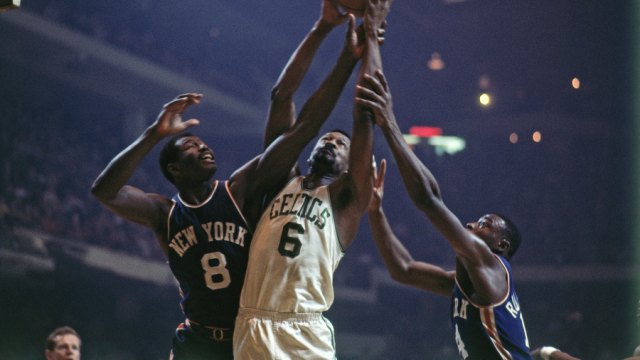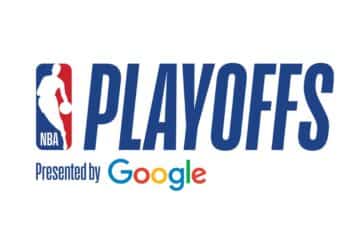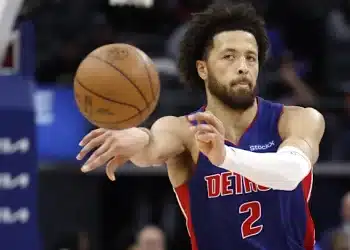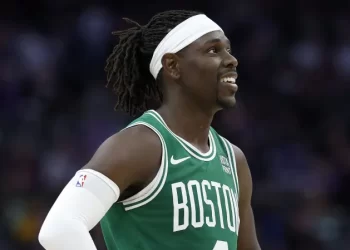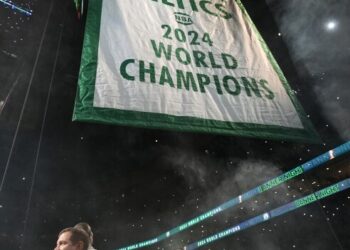By: Greg Rector
Bill Russell (1934-2022)
The incomparable Bill Russell passed away peacefully at age 88 on Sunday. His accolades today are well earned, not just for his contributions on the basketball court but for his humanity and activism outside of his basketball career. I became a basketball fan after his playing career in the mid-1970s but Bill Russell’s name was almost immediately mentioned whenever basketball was discussed. We didn’t have much coverage of the NBA, especially on television so much so that to watch games we would have to stay up late and watch games on tape delay. It was after Russell’s second head coaching job ended in 1977 that I became much more aware of Bill Russell as he started doing tv work for CBS. His analysis was brilliant and you would always learn the nuances of the game from listening to Russell.
The Career University of San Francisco
Bill Russell was a 6’10” center with a 7’4″ wingspan who was not heavily recruited out of high school. Like a certain other famous player decades later whom we all know Russell was cut from his junior high school basketball team, he didn’t understand the fundamentals but once he was in high school that all changed. “To play good defense…it was told back then that you had to stay flatfooted at all times to react quickly. When I started to jump to make defensive plays and to block shots, I was initially corrected, but I stuck with it, and it paid off.” He also became obsessed with studying his opponent’s moves by reading Dell Magazines basketball articles and learning how he could become a better defender against them, long before the ability to have film study. One of his high school teammates at McClymonds High School in Oakland, California was future major league star and Baseball hall of Fame inductee Frank Robinson.
Russell was ignored by college basketball recruiters as his fundamentals on offense were described with one word, atrocious. Only one school recruited him and that was the University of San Francisco. He lucked out as the Dons were coached by a man named Phil Woolpert who emphasized defense and a slower-paced half-court game, perfect for Russell’s style and strengths as a player. At USF he was joined by future Celtics teammate K.C. Jones and Hal Perry to become the first trio of starting African-American players at a major NCAA program. Russell combined his tenacity with speed to challenge opponents. His shot-blocking and man-to-man defensive abilities were so good that by his junior season the NCAA had to widen the lane. After he graduated a second rule was imposed restricting basket interference. The San Francisco Dons became a powerhouse and won back-to-back NCAA titles in 1955 and 1956 led by Russell’s dominating defense. This is also where he faced plenty of racism especially when the Dons were on the road. Even in his native Northern California, “At that time it was never acceptable that a black player was the best. That did not happen…My junior year in college, I had what I thought was one of the best college seasons ever. We won 28 of 29 games. We won the National Championship. I was the MVP of the Final Four. I was first-team All-American. I averaged over 20 points and 20 rebounds, and I was the only guy in college blocking shots. So after the season was over, they had a Northern California banquet, and they picked another center as Player of the Year in Northern California. well, that let me know that if I were to accept these as the final judges of my career I would die a bitter old man.” Instead, Russell resolved to be the best team player he could be. I believe he proved that magnificently. Russell was also a high-jumper and ran the 440 (400 meters) yard dash in a time of 49.6 seconds.
Professional Career
Before entering the NBA Russell was wooed by the Harlem Globetrotters to join them. In another case of racial prejudice long-time Globetrotters owner, Abe Saperstein would only talk to Russell’s coach about the matter while having an assistant coach entertain Russell, which made Russell livid. He would say years later that if Saperstein thought he was too smart to speak with him, then he was too smart to play for Saperstein. Instead, Russell was drafted by the Boston Celtics. He is only one of four players in basketball history to have won a national championship and then an NBA title in back-to-back seasons (Henry Bibby, Magic Johnson, and Billy Thompson) he also added the Olympic gold medal in 1956 to his haul. We all know about the 11 NBA titles in 13 seasons for the Celtics, the last two as the first black coach in a major professional sport. The accolades are just too numerous and Bill Russell simply put defined the team first mentality, he made everyone around him better. His battles with wilt Chamberlain are still talked about today. Wilt was the great individual dominating force, while Russell and the Celtics were the consummate team. Here’s how dominant Russell was defensively, number one in defensive win shares with a mark of 133.6, trailing in a very far distance only a guy who was an all-defensive player for 15 seasons Tim Duncan with a 106.3 rating. Named to the NBA 25th, 35th, 50th, and 75th NBA anniversary teams. It all speaks for itself. His influence has lasted for generations. Think of smaller players who could defend those much bigger players such as Dennis Rodman, Charles Barkley, and Draymond Green.
Social Activism
It’s in this area that your writer a life-long Lakers fan wants to honor the legend. Bill Russell was given the Presidential Medal of Freedom in 2010 by then-President Barack Obama. It wasn’t only for his legendary basketball career. Bill Russell knew racial injustice all too well and fought against it with eloquence and dignity. He marched with Dr.Martin Luther King and in 1967 was one of the most prominent professional athletes to attend the “Cleveland Summit,” in support of Muhammad Ali’s stance against being drafted into the military, along with NFL legend Jim Brown and a young college basketball superstar then known as Lew Alcindor (Kareem Abdul- Jabbar) Russell worked for so many different children’s organizations over the years it is impossible to list all of them. in 2009 Russell wrote of his grandfather’s motto, passed to his father and then to him. “A man has to draw a line inside himself that he won’t allow any man to cross.” He wrote those words after recounting how his grandfather had stood up to the Ku Klux Klan and other whites who had tried to stop his grandfather from building a schoolhouse for black children. “I am proud of my grandfather’s heroic dignity against forces more powerful than him…he would not allow himself to be oppressed or intimidated by anyone.” Many other cases of racial prejudice occurred throughout Russell’s career. In 1961 Russell led a boycott by the Celtics black players after they were refused service at a Lexington. Kentucky restaurant. Three years prior in North Carolina Russell and other black players were denied rooms while on a tour of NBA All-Stars something Russell wrote about in his 1966 memoir. “It stood out, a wall which understanding cannot penetrate. You are a Negro. You are less. It covered every area. a living, smarting, hurting, smelling, greasy substance which covered you. A morass to fight from.” His fight for a more just society never wavered. On September 26th,2017 then 83 year Bill Russell, took to social media and posted a picture of himself TAKING A KNEE with his Presidential Medal of Freedom around his neck in support of Colin Kaepernick’s stance against police brutality. His unwavering support of racial and social justice is why I respected Bill Russell so much, after all as a Lakers fan there was a deep respect for his basketball skills, we just don’t like the Boston Celtics at all. He had a turbulent relationship with Boston over many issues and that is also well documented, so much so that he didn’t attend his retirement ceremony originally and didn’t partake in anything to do with the Celtics in person until they moved to the new TD Gardens in 1999.
Today basketball and the world lost a great man. May you Rest in Peace Mr.Russell. A fond farewell to a King on and off the court.


 NFL
NFL